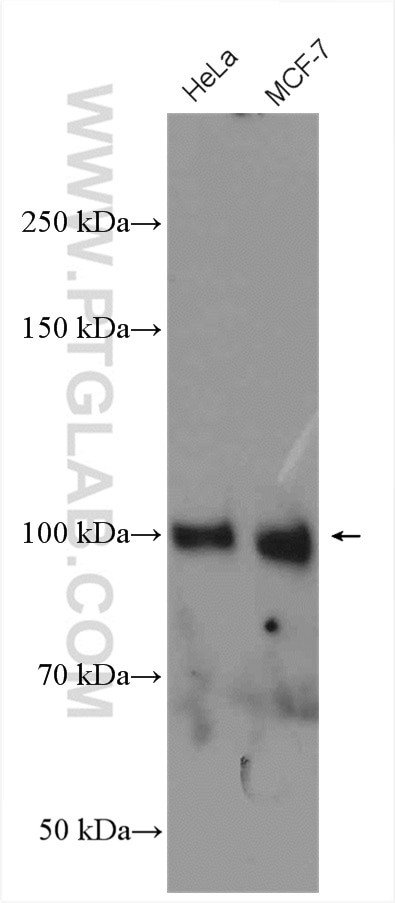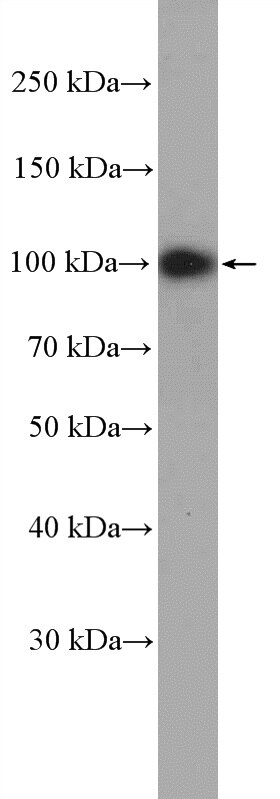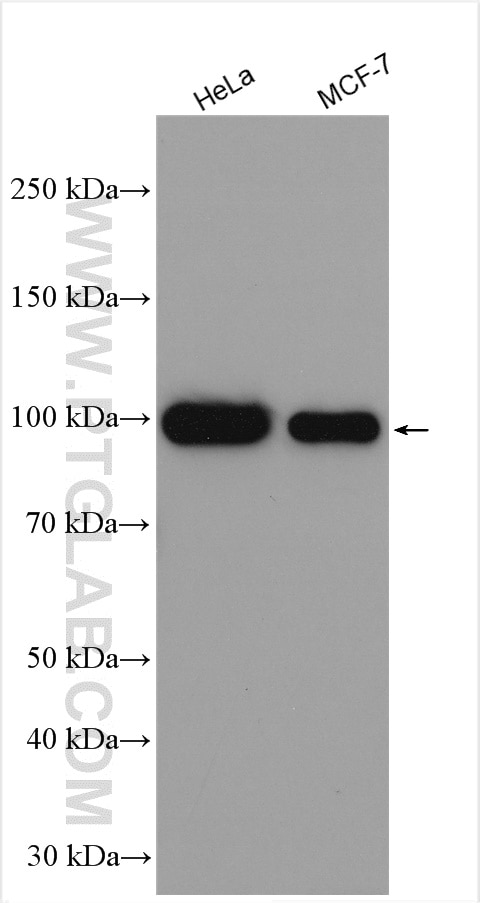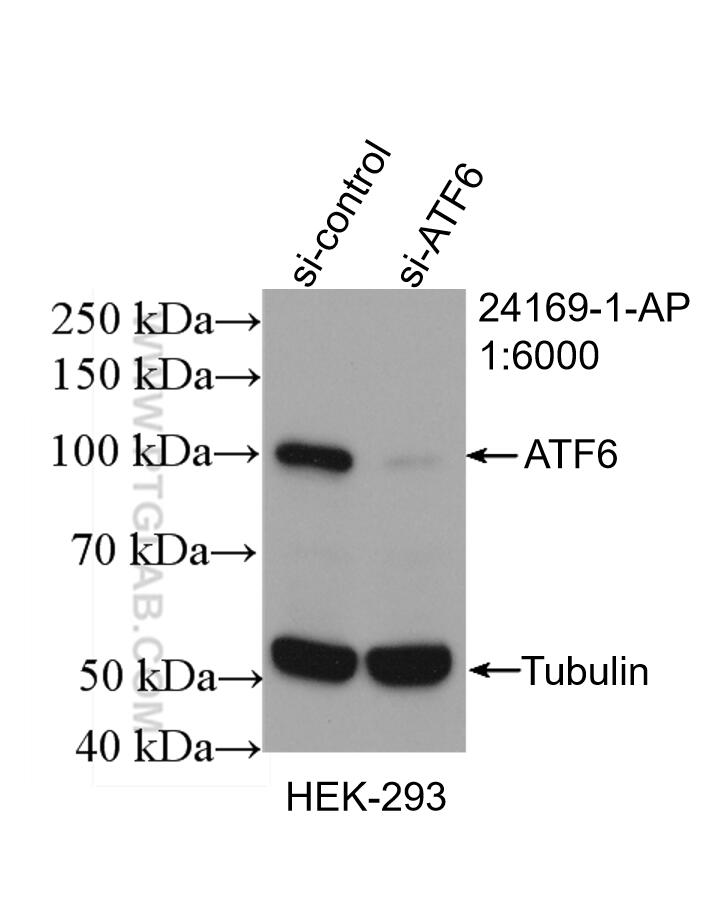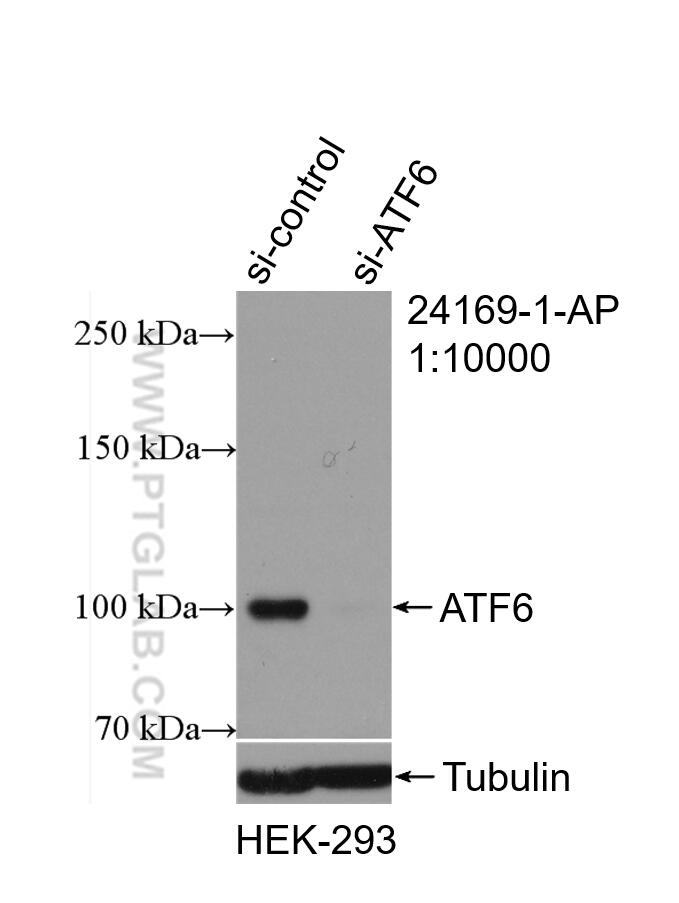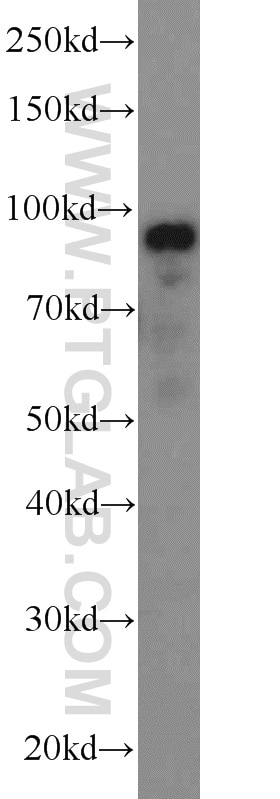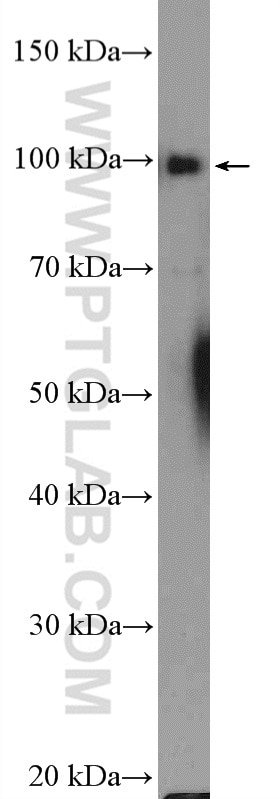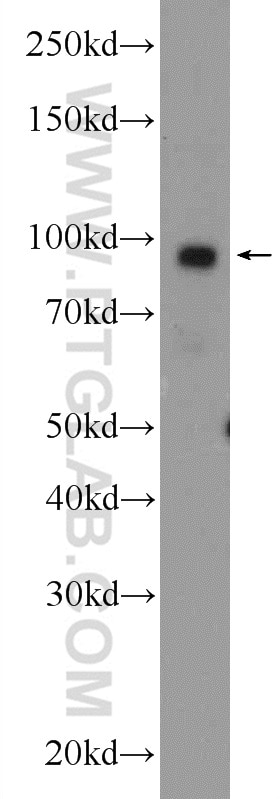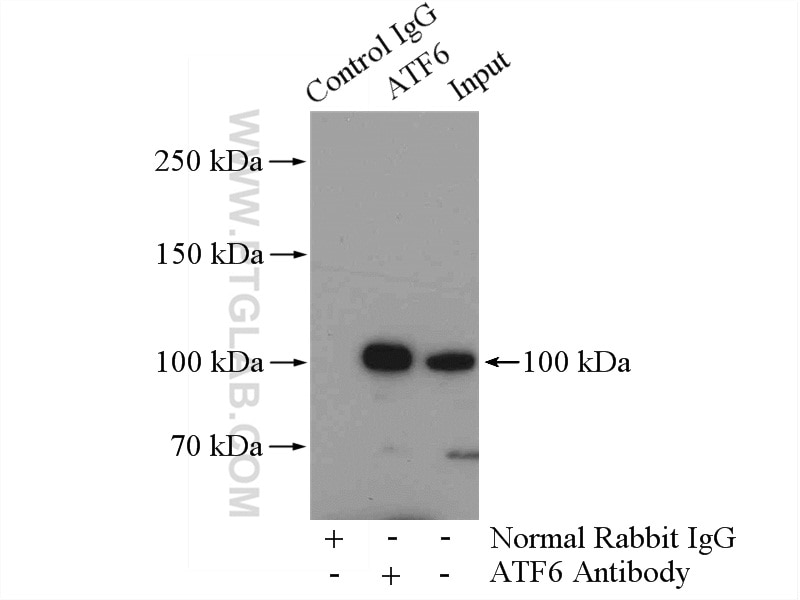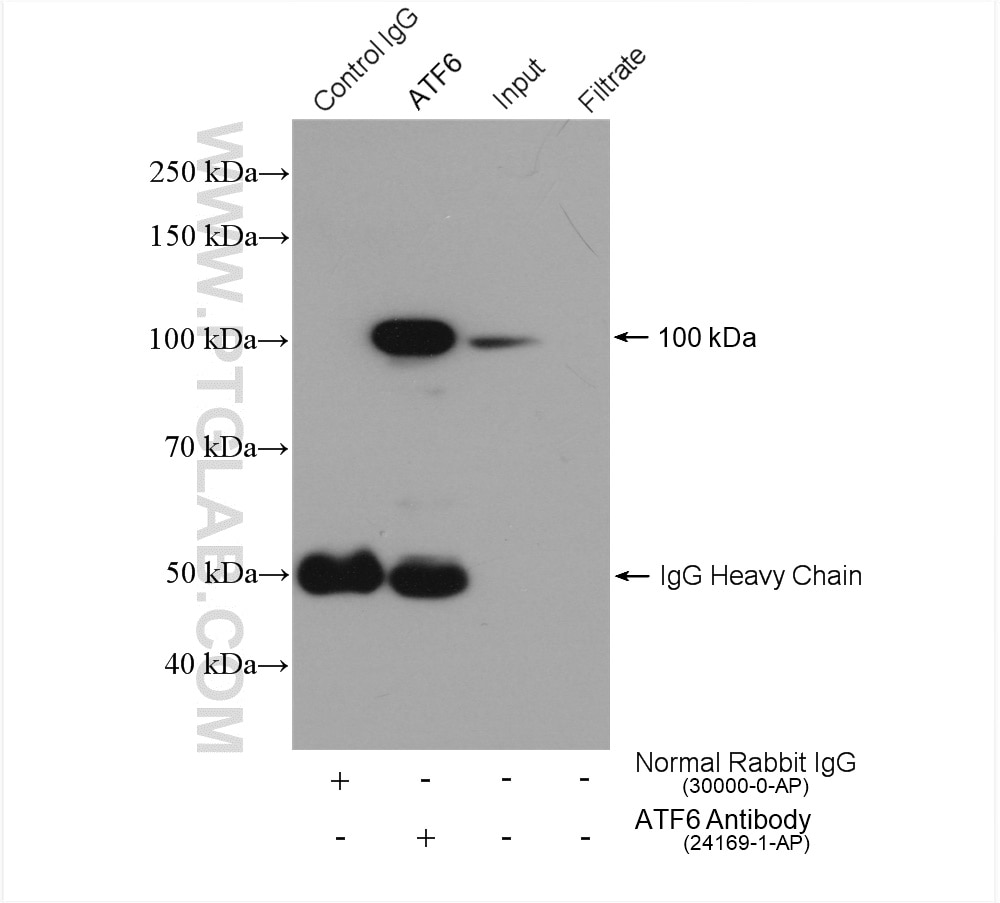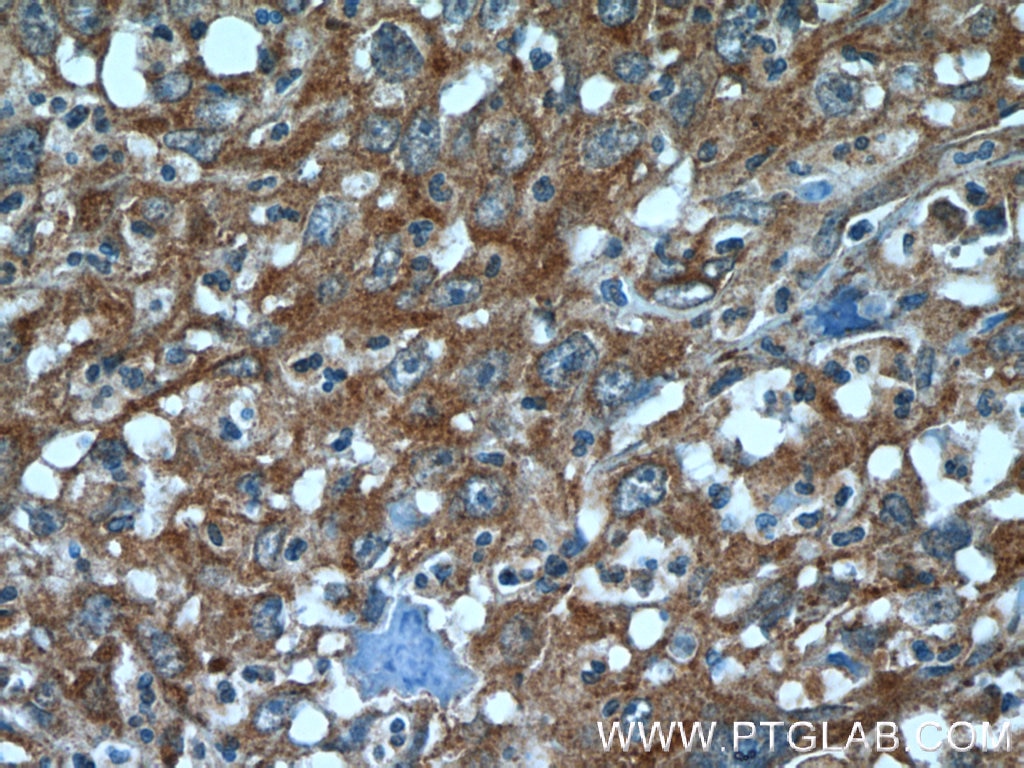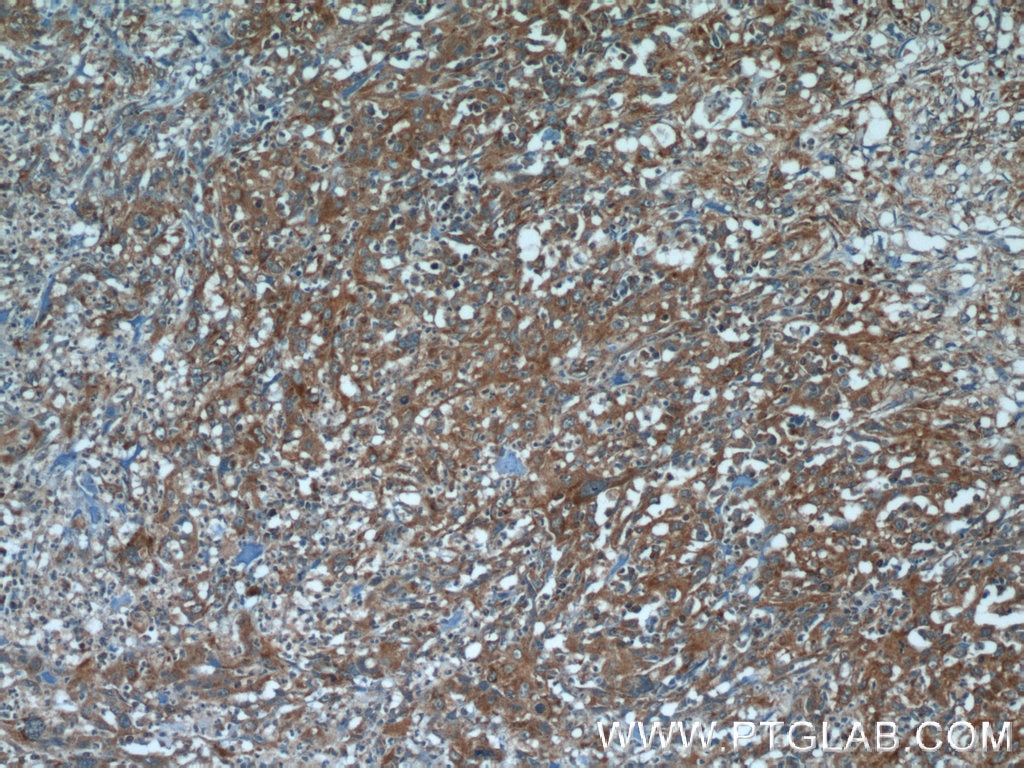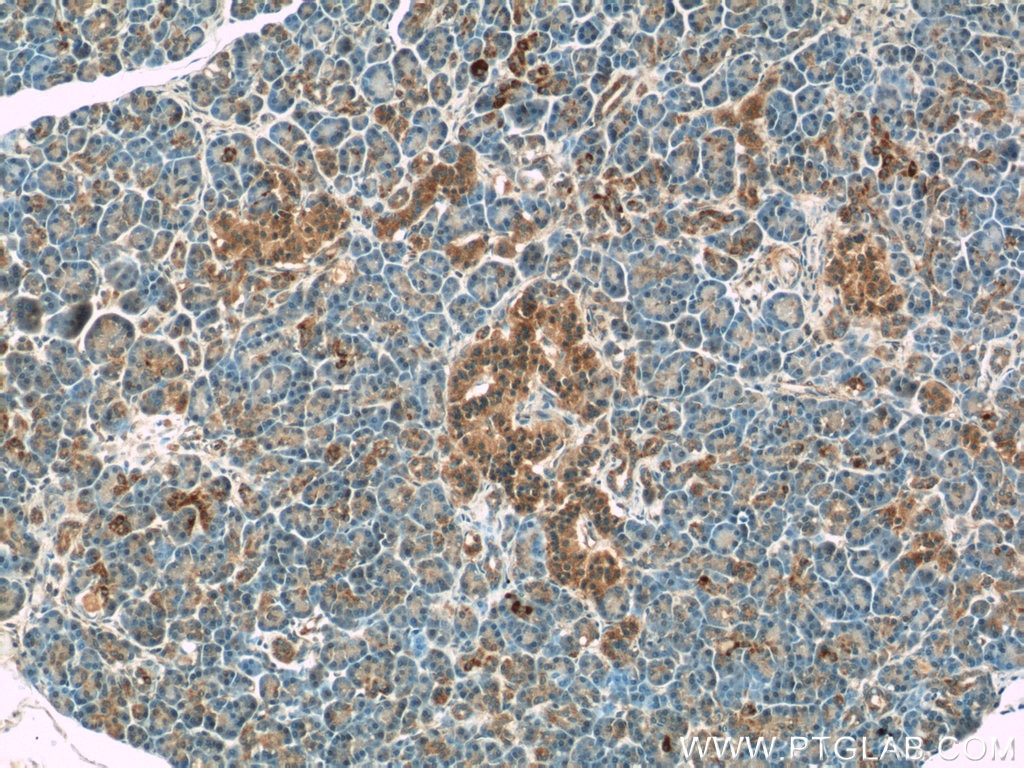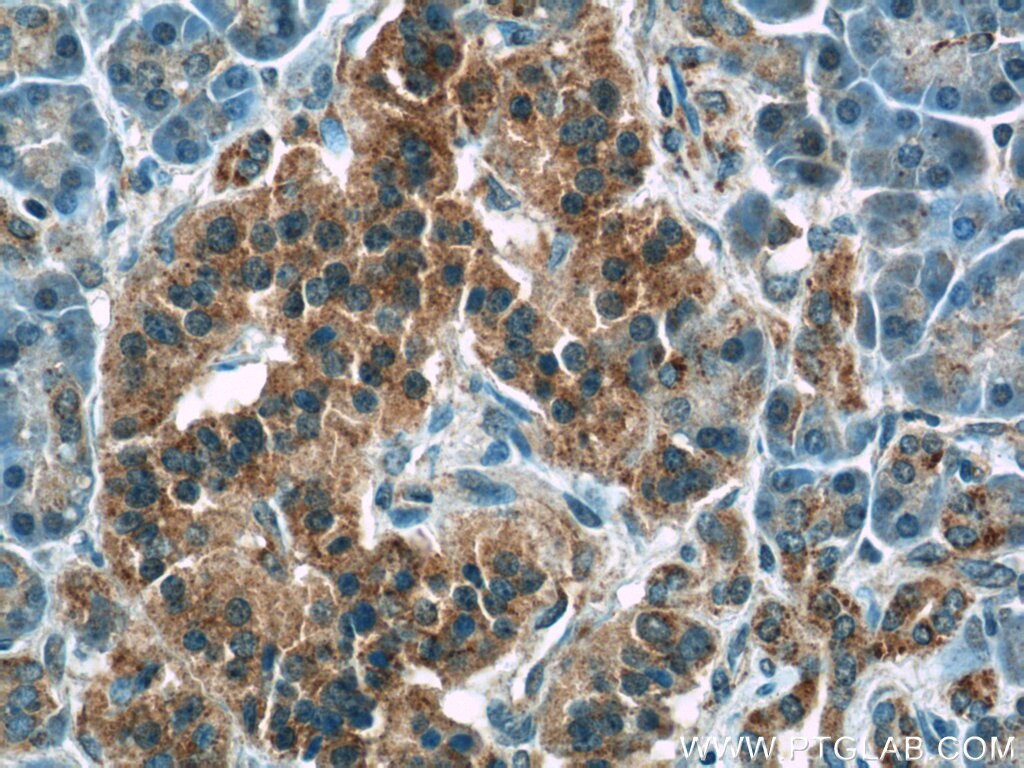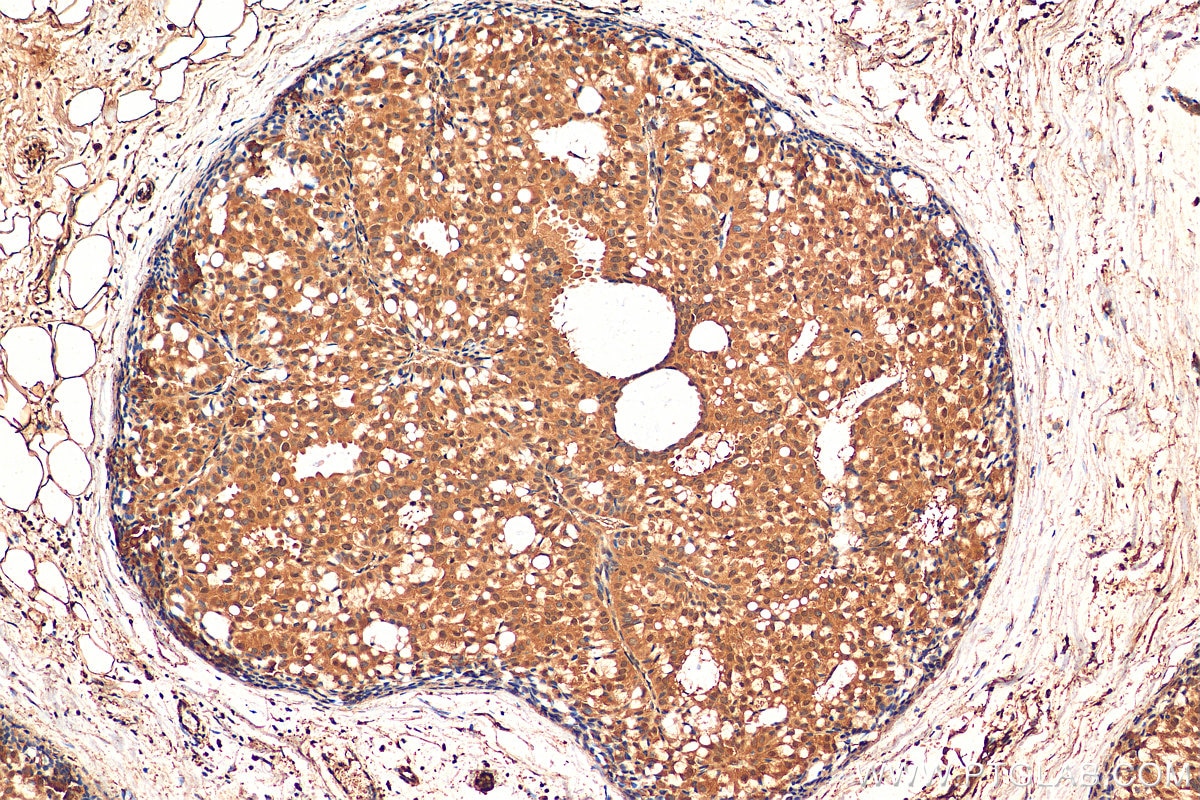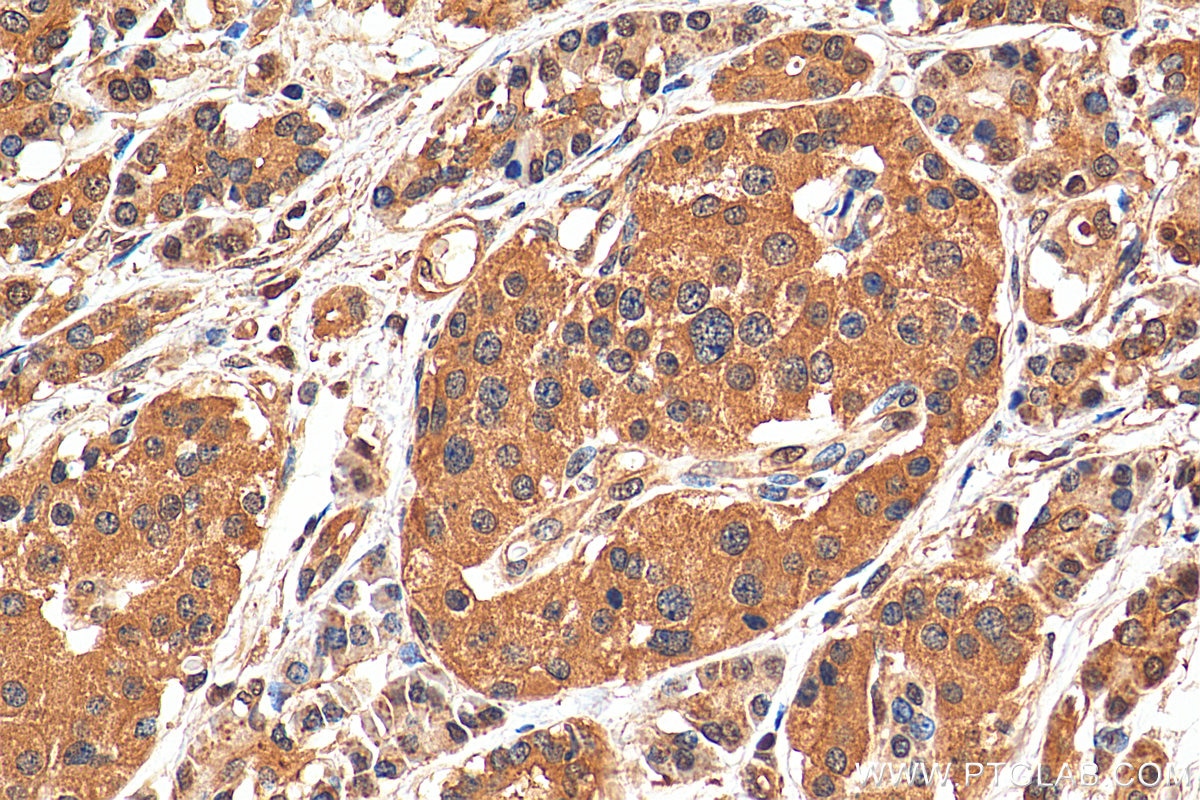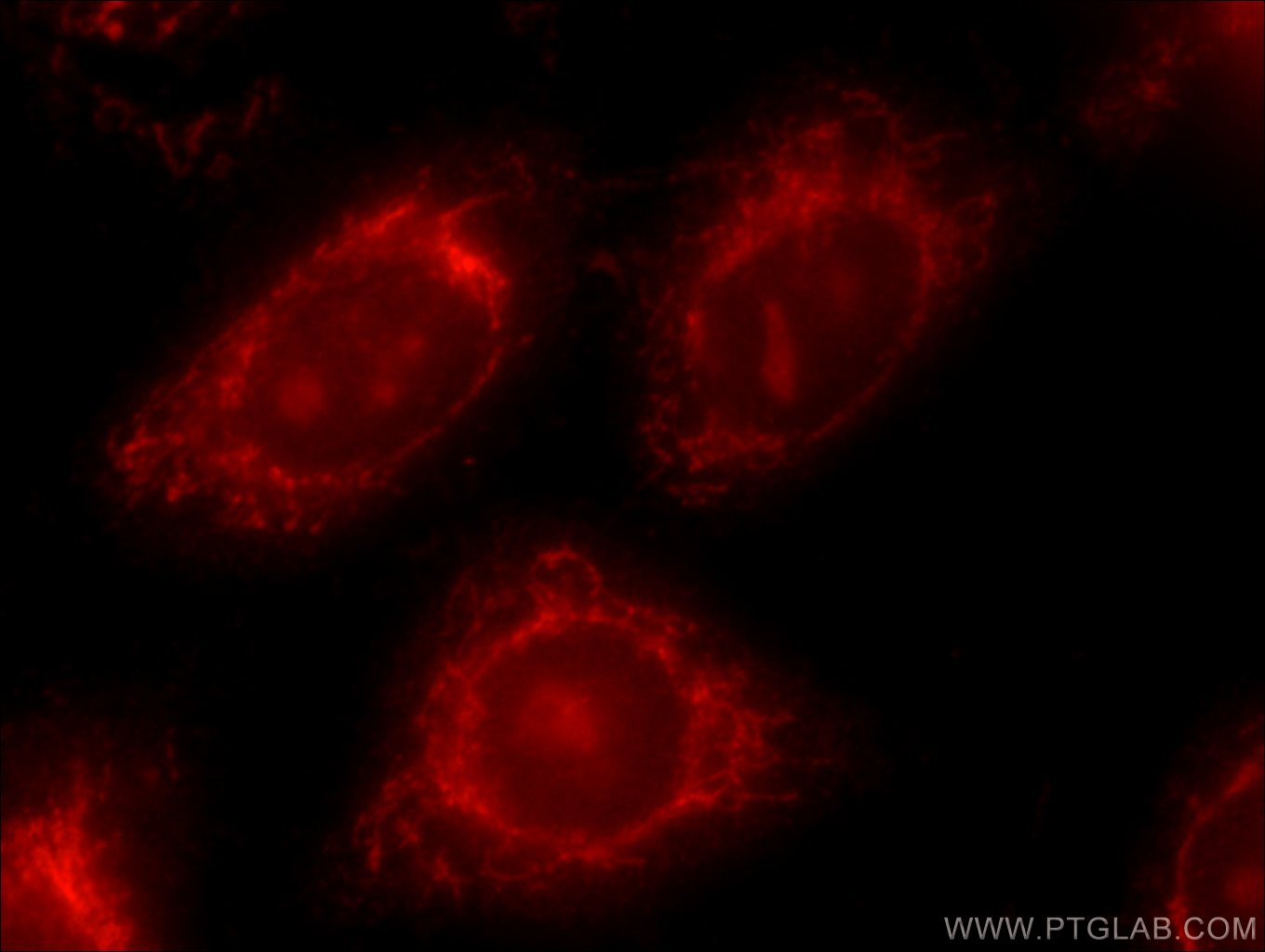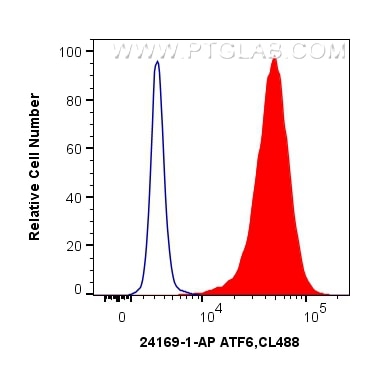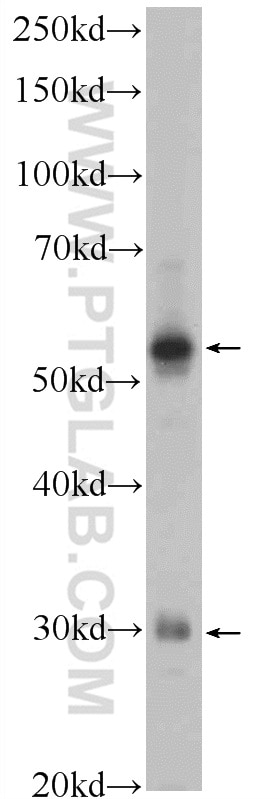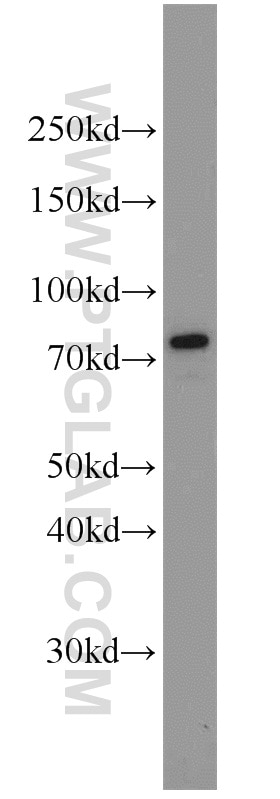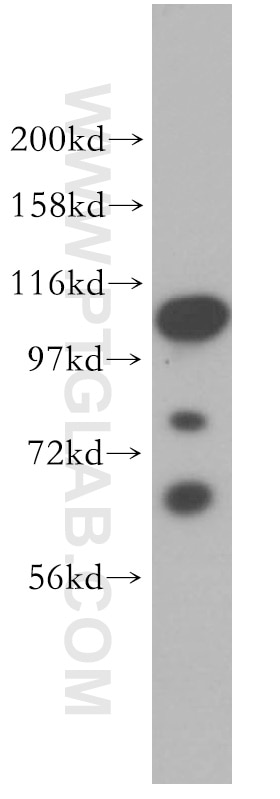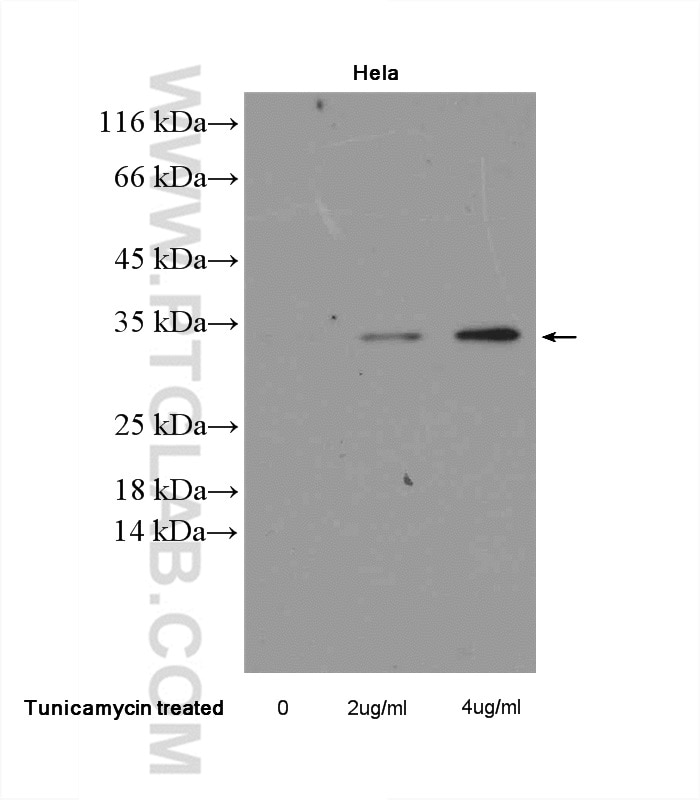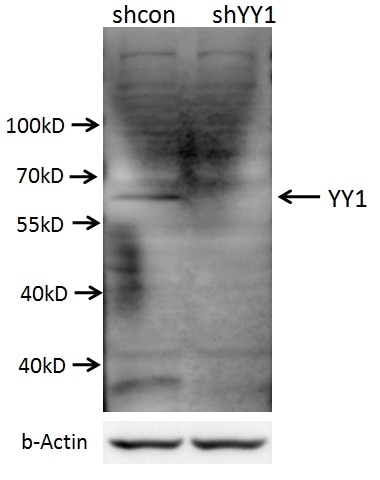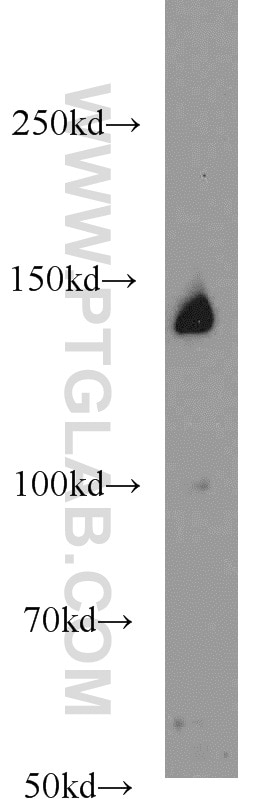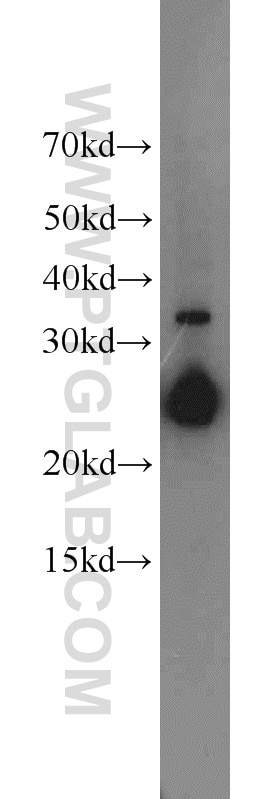- Featured Product
- KD/KO Validated
ATF6 Polyklonaler Antikörper
ATF6 Polyklonal Antikörper für FC, IF, IHC, IP, WB, ELISA
Wirt / Isotyp
Kaninchen / IgG
Getestete Reaktivität
human, Maus, Ratte und mehr (3)
Anwendung
WB, IP, IHC, IF, FC, ELISA
Konjugation
Unkonjugiert
Kat-Nr. : 24169-1-AP
Synonyme
Galerie der Validierungsdaten
Geprüfte Anwendungen
| Erfolgreiche Detektion in WB | HeLa-Zellen, HEK-293-Zellen, MCF-7-Zellen |
| Erfolgreiche IP | HeLa-Zellen |
| Erfolgreiche Detektion in IHC | humanes Zervixkarzinomgewebe, humanes Mammahyperplasie-Gewebe, humanes Pankreasgewebe, humanes Pankreaskarzinomgewebe Hinweis: Antigendemaskierung mit TE-Puffer pH 9,0 empfohlen. (*) Wahlweise kann die Antigendemaskierung auch mit Citratpuffer pH 6,0 erfolgen. |
| Erfolgreiche Detektion in IF | HeLa-Zellen |
| Erfolgreiche Detektion in FC | HeLa-Zellen |
Empfohlene Verdünnung
| Anwendung | Verdünnung |
|---|---|
| Western Blot (WB) | WB : 1:2000-1:14000 |
| Immunpräzipitation (IP) | IP : 0.5-4.0 ug for 1.0-3.0 mg of total protein lysate |
| Immunhistochemie (IHC) | IHC : 1:20-1:200 |
| Immunfluoreszenz (IF) | IF : 1:10-1:100 |
| Durchflusszytometrie (FC) | FC : 0.40 ug per 10^6 cells in a 100 µl suspension |
| It is recommended that this reagent should be titrated in each testing system to obtain optimal results. | |
| Sample-dependent, check data in validation data gallery | |
Veröffentlichte Anwendungen
| KD/KO | See 15 publications below |
| WB | See 201 publications below |
| IHC | See 13 publications below |
| IF | See 15 publications below |
| IP | See 2 publications below |
Produktinformation
24169-1-AP bindet in WB, IP, IHC, IF, FC, ELISA ATF6 und zeigt Reaktivität mit human, Maus, Ratten
| Getestete Reaktivität | human, Maus, Ratte |
| In Publikationen genannte Reaktivität | human, Affe, Hausschwein, Huhn, Maus, Ratte |
| Wirt / Isotyp | Kaninchen / IgG |
| Klonalität | Polyklonal |
| Typ | Antikörper |
| Immunogen | ATF6 fusion protein Ag21456 |
| Vollständiger Name | activating transcription factor 6 |
| Berechnetes Molekulargewicht | 75 kDa |
| Beobachtetes Molekulargewicht | 60 kDa, 90-100 kDa |
| GenBank-Zugangsnummer | BC014969 |
| Gene symbol | ATF6 |
| Gene ID (NCBI) | 22926 |
| Konjugation | Unkonjugiert |
| Form | Liquid |
| Reinigungsmethode | Antigen-Affinitätsreinigung |
| Lagerungspuffer | PBS mit 0.02% Natriumazid und 50% Glycerin pH 7.3. |
| Lagerungsbedingungen | Bei -20°C lagern. Nach dem Versand ein Jahr lang stabil Aliquotieren ist bei -20oC Lagerung nicht notwendig. 20ul Größen enthalten 0,1% BSA. |
Hintergrundinformationen
Activating transcription factor 6 (ATF6) is a transcription factor that acts during endoplasmic reticulum stress by activating unfolded protein response target genes. Binds DNA on the 5'-CCAC[GA]-3'half of the ER stress response element (ERSE) (5'-CCAAT-N(9)-CCAC[GA]-3') and of ERSE II (5'-ATTGG-N-CCACG-3'). Binding to ERSE requires binding of NF-Y to ERSE. Could also be involved in activation of transcription by the serum response factor.During unfolded protein response an approximative 50 kDa fragment containing the cytoplasmic transcription factor domain is released by proteolysis. The cleavage seems to be performed sequentially by site-1 and site-2 proteases. The fully glycosylated form of ATF6, a 670 amino acid protein, exhibits an electrophoretic mobility of ~90 kDa in denaturing SDS-gels, in part because of the glycosylated modifications. ATF6 has 3 consensus sites for N-linked glycosylation and exists constitutively as a glycosylated protein. Differentially glycosylated ATF6 forms may result from mutations or experimental treatment (PMID:15804611) (PMID:14699159). The antibody recognizes cleaved and fully glycosylated forms of ATF6.
Protokolle
| Produktspezifische Protokolle | |
|---|---|
| WB protocol for ATF6 antibody 24169-1-AP | Protokoll herunterladen |
| IHC protocol for ATF6 antibody 24169-1-AP | Protokoll herunterladen |
| IF protocol for ATF6 antibody 24169-1-AP | Protokoll herunterladen |
| IP protocol for ATF6 antibody 24169-1-AP | Protokoll herunterladen |
| Standard-Protokolle | |
|---|---|
| Klicken Sie hier, um unsere Standardprotokolle anzuzeigen |
Publikationen
| Species | Application | Title |
|---|---|---|
Cell Stem Cell Amino acid catabolism regulates hematopoietic stem cell proteostasis via a GCN2-eIF2α axis. | ||
J Clin Invest Ubiquitination of ATF6 by disease-associated RNF186 promotes the innate receptor-induced unfolded protein response. | ||
J Clin Invest Sec13 promotes oligodendrocyte differentiation and myelin repair through autocrine pleiotrophin signaling. | ||
J Clin Invest Inhibition of the unfolded protein response reduces arrhythmia risk after myocardial infarction. | ||
Circ Res ATF6 Decreases Myocardial Ischemia/Reperfusion Damage and Links ER Stress and Oxidative Stress Signaling Pathways in the Heart. | ||
Redox Biol FUT2-dependent fucosylation of HYOU1 protects intestinal stem cells against inflammatory injury by regulating unfolded protein response |
Rezensionen
The reviews below have been submitted by verified Proteintech customers who received an incentive forproviding their feedback.
FH Richard (Verified Customer) (11-12-2019) | The antibody works well and gives two clean bands for cleaved and uncleaved ATF6 by western blot.
|
